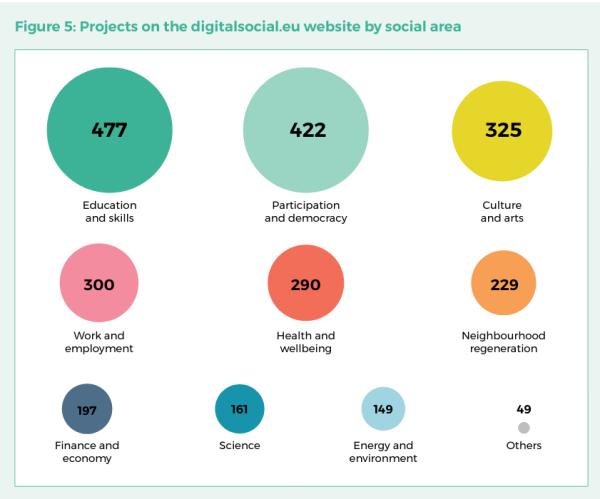Digital Social Innovation: executive summary
Impact is still low, but there is hope!

This is a synthesis of the executive summary and key findings of a report about What’s next for Digital Social Innovation (DSI). The report was published in 2017, but judging from my own experience, its conclusions are still absolutely current and valid, and therefore deserve further exposure.
Executive Summary
The report explores the recent evolution of DSI, barriers to growth, and what needs to be done by policymakers, funders and practitioners to make the most of the opportunities in DSI.
As of May 2017, there are 1,883 organisations and 1,051 projects on the digitalsocial.eu platform. The most common technologies used by projects are Social Media and Social Networks; Crowdsourcing, Crowdmapping and Crowdfunding; and Mobile and Web Apps, while the most common social areas of activity are (see chart above) Education and Skills; Participation and Democracy; and Culture and Arts.
Geographically, most activity is taking place in Western and Southern Europe with the UK, France and Spain showing the highest level of activity, with Northern Europe less active and Eastern Europe even less active (and cities more active than rural areas: unsurprising, but NOT good. Not at all).
(as the key findings below show) We are far from making the most of the potential in DSI.
At the level of individual organisations and projects, the main barriers lie in engaging citizens, planning for growth and developing sustainable business models. These barriers are compounded by the lack of understanding and measurement of impact in DSI.
Key findings
- (As of May 2017) There are almost 2,000 organisations and over 1,000 projects involved in digital social innovation (DSI) across Europe, with the highest concentration of activity in Western and Southern Europe.
- Despite this activity, there are relatively few examples of DSI initiatives delivering impact at scale. The growth of DSI is being held back by barriers at the system level and at the level of individual projects.
- Projects and organisations involved in DSI are still relatively poorly connected to each other. There is a pressing need to grow strong networks within and across countries and regions to boost collaboration and knowledge-sharing.
- The growth of DSI is being held back by lack of funding and investment across the continent, especially outside Western Europe, and structural digital skills shortages.
- Civil society organisations and the public sector have been slow to adopt DSI, despite the opportunity it offers them to deliver better services at a lower cost, although there are emerging examples of good practice from across Europe.
- Practitioners struggle to engage citizens and users, understand and measure the impact of their digital social innovations, and plan for growth and sustainability.
My own synthesis of the final recommendations of the report is here.
Full Disclosure:
I am deeply interested in this stuff because I work on it, both personally and as a consultant, and through the Free Knowledge Institute.